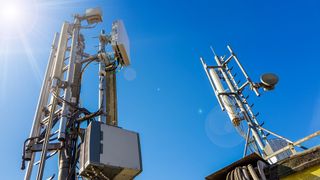UK 5G spectrum auction will finally go ahead this week
The much awaited auction will involve companies bidding for frequency in two bands

Ofcom has announced that it is finally launching the long-delayed UK 5G spectrum auction this week which it hopes will result in better mobile services and access to 5G technology.
The auction, which was originally due to kick off in 2017, will increase the total amount of spectrum available for mobile technology in the UK by approximately a fifth. Devices that communicate wirelessly need spectrum, including televisions, car key fobs and satellites.
The auction will involve companies bidding for spectrum in two different frequency bands, the 700MHz band and the 3.6-3.8GHz band. The latter is the primary band for 5G.
In the 700 MHz band, there will be 80 MHz available to bid on. In the 3.6-3.8 MHz band, there will be 120 MHz available.
Four companies will take part in the auction: EE Limited, Hutchison 3G UK Limited, Telefónica UK Limited and Vodafone Limited. IT Pro has contacted them all for comment.
The auction will be divided into two parts. The main one is called the principal stage and is where prices go up with bids and the bids determine how much spectrum each party acquires.
In the principal stage, each spectrum is available at a reserve, or minimum price. The reserve price for each 700MHz portion is £1 million and there are four lots of spectrum, each made up of 10 MHz. The reserve for each 700MHz paired frequency lot is £100m and there are six lots of spectrum (each of 2x5 MHz).
Get the ITPro. daily newsletter
Receive our latest news, industry updates, featured resources and more. Sign up today to receive our FREE report on AI cyber crime & security - newly updated for 2024.
The reserve price for each 3.6 GHz lot is £20m and there are 24 lots of spectrum (each of 5 MHz) available.
The bidders will bid for a number of lots in each band at the given price, which is set by Ofcom. If the demand for the available lots is equal or larger than the amount available then the price for each frequency will go up in the next round and bidders can place their bids again. This continues until there are no new bids in a round.
The second stage is called the assignment stage and determines the precise frequencies of the airwaves won by each bidder. Interestingly, winners of the 3.6-3.8 GHz band are allowed to negotiate the specific frequencies among themselves if they want to join together the airwaves they have secured within the band.
The auction could go on for several weeks and the length will depend on the level of demand for the spectrum available. At the end of each bidding day during the principal stage, Ofcom will publish the prices for the lots in the last round and a measure of demand in each band.
In January, Ofcom announced the long-awaited 5G spectrum auction was to be delayed again until March. The auction has suffered from delays since at least 2017, where Three attempted to have a 30% cap placed on the auction which would have blocked the larger providers from bidding against smaller rivals.
The High Court ruled against Three in December 2017 and the case was then sent to the Court of Appeal. The decision was upheld in 2018.
Zach Marzouk is a former ITPro, CloudPro, and ChannelPro staff writer, covering topics like security, privacy, worker rights, and startups, primarily in the Asia Pacific and the US regions. Zach joined ITPro in 2017 where he was introduced to the world of B2B technology as a junior staff writer, before he returned to Argentina in 2018, working in communications and as a copywriter. In 2021, he made his way back to ITPro as a staff writer during the pandemic, before joining the world of freelance in 2022.






